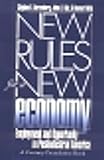New Rules for a New Economy : Employment and Opportunity in Post-Industrial America / John A. Alic, Stephen A. Herzenberg, Howard Wial.
Material type: TextPublisher: Ithaca, NY : Cornell University Press, [2018]Copyright date: ©2000Description: 1 online resource (240 p.) : 30 tables, 5 charts/graphsContent type:
TextPublisher: Ithaca, NY : Cornell University Press, [2018]Copyright date: ©2000Description: 1 online resource (240 p.) : 30 tables, 5 charts/graphsContent type: - 9781501725593
- Employment forecasting -- United States
- Labor market -- United States
- Manufacturing industries -- Employees -- Supply and demand -- United States -- Forecasting
- Service industries workers -- Supply and demand -- United States -- Forecasting
- General Economics
- Labor History
- POLITICAL SCIENCE / Labor & Industrial Relations
- 331.12/0973 21
- online - DeGruyter
| Item type | Current library | Call number | URL | Status | Notes | Barcode | |
|---|---|---|---|---|---|---|---|
 eBook
eBook
|
Biblioteca "Angelicum" Pont. Univ. S.Tommaso d'Aquino Nuvola online | online - DeGruyter (Browse shelf(Opens below)) | Online access | Not for loan (Accesso limitato) | Accesso per gli utenti autorizzati / Access for authorized users | (dgr)9781501725593 |
Frontmatter -- Contents -- Foreword -- Preface -- 1. Recreating the Prosperity of the Past in the Economy of the Future -- 2. The Service Economy and the Service Worker -- 3. Work Systems -- 4. The Dynamics of Change in Work Systems -- 5. Reorganizing Work: Using Knowledge and Skill to Improve Economic Performance -- 6. Business Organization -- 7. Creating Multiemployer Institutions: Career Paths and Performance Improvement -- 8. A New Deal for a New Economy -- Appendix A. Services Compared with Manufacturing: Jobs and Productivity -- Appendix B. Employment Estimates by Work System -- Notes -- Index
restricted access online access with authorization star
http://purl.org/coar/access_right/c_16ec
Three quarters of the American workforce is now employed in services, a substantial portion in low-paying, dead-end jobs. Can the service economy do as well by the American worker as the old manufacturing economy? Can the widely shared prosperity that accompanied steady increases in productivity and performance in manufacturing be replicated in the services? They can and they will, the authors of this timely book contend, but only if outmoded policies and practices are brought into line with the new economy. New Rules for a New Economy explains why this must be accomplished and how we can start.The authors call for new, decentralized institutions suited to a dynamic economy in which change is constant and rapid. In particular, they see a need for job ladders and worker associations that cut across firm boundaries. These institutions would foster individual and collective learning, mark out career paths, and facilitate coordination among both individuals and organizations in a networked economy. The authors propose new rules to reshape labor market institutions and policy, improving economic performance and opportunities for workers. Unusual in providing a comprehensive theoretical perspective that is grounded in detailed case research, this book points the way to a better future, not just for elite knowledge workers but for everyone.
Mode of access: Internet via World Wide Web.
In English.
Description based on online resource; title from PDF title page (publisher's Web site, viewed 26. Apr 2024)


